Israel marks 70 years as a nation as new and old challenges lurk

Israeli youths dressed in memorabilia depicting the Israeli flag watch fireworks over the center of Jerusalem late on April 18, 2018, during the conclusion of Memorial Day and the start of the 70th Independence Day celebrations. AFP
JERUSALEM — Israel celebrated 70 years since the country’s foundation on Wednesday, lauding its improbable economic success and military prowess, but facing a range of political and security challenges.
The anniversary of the proclamation of the state of Israel by founding father David Ben-Gurion began at sundown on Wednesday under the Hebrew calendar, but falls on May 14 according to the Western calendar.
At the traditional Jerusalem torch-lighting ceremony kicking off what Israelis call Independence Day, Prime Minister Benjamin Netanyahu welcomed what he called “real seeds of peace” he said were beginning to sprout among some of Israel’s Arab neighbours.
He did not elaborate, but there have been signs of warming ties, particularly with Saudi Arabia which — like Israel — sees Iran as a growing threat.
“Our hand is outstretched in peace to all of our neighbours who want peace,” Netanyahu said in Hebrew.
“And to our enemies who think that we are a passing phenomenon, I have news for you: In 70 years from now you fill find here a country seven times stronger than what we have done so far. This is just the beginning!”
The ceremony will be followed throughout the evening by open-air concerts, public dancing and fireworks across Israel.
Earlier, at a remembrance day ceremony, Netanyahu spoke of the “barbaric zealotry of radical Islam” and reiterated warnings about Iran and its presence in neighbouring Syria.
He has said that Israel cannot accept the Islamic republic entrenching itself militarily in the war-torn country, where Tehran is backing President Bashar al-Assad’s regime.
An air strike attributed to Israel on April 9 at Syria’s T-4 airbase left 14 people dead, including seven Iranian personnel.
Ali Akbar Velayati, foreign policy adviser to Iranian supreme leader Ayatollah Ali Khamenei, threatened a response.
Israel has refused to confirm or deny the strike, though satellite photographs were distributed this week through Israeli media purporting to show Iranian drones at airfields in Syria.
Some Israeli analysts interpreted the move as a message to Iran that Israel could strike its positions if it carries out an attack against the Jewish state.
Israel also alleges that a drone which penetrated its airspace in February was sent by Iran “armed with explosives and was tasked to attack”.
It was shot down by an Israeli helicopter, and Israel in retaliation attacked what it said were the drone’s Iranian control systems in Syria.
“The Israeli defence establishment understands that the (Iranian) Revolutionary Guard is most likely to be the designated unit that will try to wage an attack against Israel,” an Israeli security source said this week, declining to comment further.
Israel has also reduced its air force’s participation in an exercise in the United States next month, with army radio reporting the decision was due to the tensions.
Gaza protests
But beyond its concerns over Iran, Israel is also facing protests and clashes along its border with the Gaza Strip that have led to intense scrutiny of its open-fire rules.
Israeli forces have killed 34 Palestinians and wounded hundreds of others since the protests began on March 30. There have been no Israeli casualties.
Tens of thousands have taken part in the main protests, but a smaller number of Gazans have approached the border fence, throwing stones and rolling burning tyres at Israeli forces.
Israel says firebombs and explosive devices have also been used.
It has pledged to stop infiltrations, attacks and damage to the fence, and alleges there have been attempts at all three.
Israel also alleges Hamas, the Islamist movement that runs the Gaza Strip and with whom it has fought three wars since 2008, is using the protests as cover to carry out violence.
Palestinians however say protesters are being shot while posing no threat to soldiers, while the European Union and UN chief Antonio Guterres have called for an independent investigation.
The protests are set to last six weeks, but they peak on Fridays after the main weekly Muslim prayers.
They are likely to escalate around May 14, when the United States is expected to move its embassy in Israel from Tel Aviv to Jerusalem.
The embassy move has deeply angered the Palestinians, who see the Israeli-annexed eastern sector of the city as the capital of their future state.
On Wednesday evening, the Israeli defence ministry said security inspectors at a crossing from the north of the occupied West Bank found a bomb concealed in a Palestinian lorry, apparently meant for an Independence Day attack inside Israel.
The ministry’s Twitter account said that the inspectors located “a powerful explosive device” hidden in the vehicle’s roof.
Still, even with security threats a constant concern, Israelis were also taking account of their successes, having built the so-called “start-up nation” with its strong hi-tech industry and the most powerful military in the Middle East. /cbb














